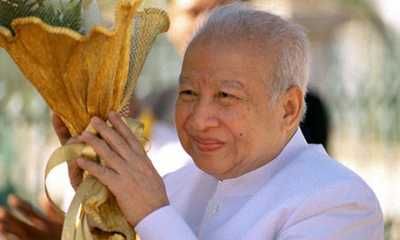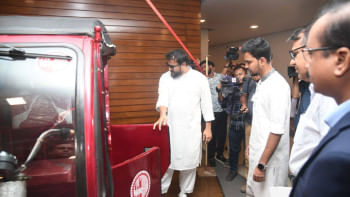Glimpses of an extraordinary gentleman

King Norodom Sihanouk
I remember that day so well. It was a hot and humid Thursday. To be exact, it was July 20, 2000. I was with Mr. Hul Pany, the Chief of Protocol, a rotund happy diplomat. We drove into the palace grounds less than a minute before 11 am with the driver of the state limousine effortlessly easing to a halt at right angles to a ceremonial guard of honour. He must have done this a thousand times, I thought!
The elegant and efficient Mrs. Khek Sysoda, of ministerial rank as befits the Palace Chief of Protocol, took over. Her bearing and confidence bespoke both the formality of the occasion and the many times she had taken charge of such ceremonies.
As soon as Mrs. Sysoda shook hands the officer commanding called the parade to attention and we walked to our designated places with Mrs. Sysoda standing alongside my wife and my colleagues from the embassy. The Singapore national anthem was played. One felt proud, really very proud. If not for the blazing mid-day sun, which was obviously no respecter of national anthems, we would have wished that the band had played on.
Mrs. Sysoda then walked us up the long flight of steps leading to the Throne Room, explaining quietly and precisely how the rest of the presentation of credentials ceremony would proceed. As she had indicated, on reaching the top of the stairs, Foreign Minister Hor Namhong appeared and greeted us and said that Their Majesties were waiting to receive us.
It was just then that you saw King Norodom Sihanouk and Queen Norodom Monineath Sihanouk at the far end of the room. You quickly took in the scene -- they were both smiling; the queen looked radiant and regal and the king was much fairer than you had imagined him to be from photographs; he was almost rosy. Then you started to walk slowly towards the royal couple. I could not recall then whether the protocol staff who had briefed me a day earlier had mentioned it, but I was nevertheless amazed when the king also started to walk towards me while the queen remained where she was. I was not prepared for that. In similar ceremonies which I had witnessed both in Singapore and elsewhere, kings and presidents remained where they were.
A diplomatic friend once confided that in some states in the bad old bipolar Cold War days, ambassadors from countries aligned to the other side were received in halls which had a long walk while those from fraternal countries made their entrances from a side door nearer the head of state! It may well have been a tongue-in-cheek trivia which I did not care to pursue, but this was certainly not the case in the Cambodian Royal Palace.
King Sihanouk continued to smile as he was walking and, as I had been advised, was the first to welcome us "from your great country." I knew precisely what to say in response -- I had rehearsed it for the umpteenth time that morning as I was shaving: "Your Majesty, my wife and I are deeply honoured to be received by Your Majesty and Her Majesty Queen Norodom Monineath Sihanouk. We bring Your Majesties very warm greetings and good wishes from our president and Mrs. Nathan."
I should have actually stopped there but I just couldn't help it. I added, in all honesty, that I had heard so much and read so much about the king and that I had never ever imagined that the day would come when I would be received by him or that I would be serving as ambassador in Cambodia.
The king smiled broadly, put his hands together as he often does and was gracious in his response. He then asked, quite unexpectedly, whether the Singapore national anthem had been "correctly played." I assured him that it had been. Then there was this somewhat uneasy silence. I was waiting for the king to say something but he was still smiling and when he was certain that I had caught his eye, he deliberately looked at my left hand. Oh my, I had forgotten, after having rehearsed a thousand times. At that stage I was supposed to have handed him the Letter of Credence from our president. The king, with his impeccable manners and his old world charm, was waiting without the slightest hint of impatience or that something was not moving according to protocol! I quickly presented him the beautifully bound bright red folder with the Singapore crest in which was the Letter of Credence. The king then officially welcomed me and wished me all the very best in what he described as "your noble duties in Cambodia." That symbolic acceptance of the Letter of Credence signalled that I now had legal and diplomatic status in Cambodia.
The king then led us to be introduced to the queen. The conversation that followed was wide ranging with the king explaining to a greenhorn ambassador his hope for Cambodia and for its people who, he said, were struggling to put the bad years behind them and were eager for a better and more secure future for their children.
King Sihanouk mentioned Mr. Lee Kuan Yew's visit to Phnom Penh in 1963. The king expressed great affection for Mr. Lee and said that he was delighted to have been the host. The king added that he would always remember Mr. Lee's comments after he had seen what a beautiful green city the then capital was. The king said that Mr. Lee had wished that "Singapore would one day be like Phnom Penh." The king was nostalgic and went on to elaborate the different destinies of the two countries in the years that followed.
What was so obvious at that first meeting was that both the king and the queen had this genius of placing visitors at ease with their genuine warmth and graciousness. That day the royal couple made five Singaporeans feel really very special.
We were to see such royal courtesy displayed so many times during our stay in Cambodia. It is no secret that the king took a personal interest in the audiences he granted and the functions he hosted and would invariably look into even the minutest of details to ensure that everything was picture perfect and welcoming.
The royal couple, for example, hosts an annual dinner and dance for the heads of diplomatic missions accredited to Cambodia. Although guests were expected to arrive at 7pm, the king would be down an hour earlier and would go through the seating arrangements, table setting and other details. He is exceptionally knowledgeable and particular about protocol. After he was comfortable that everything was in order, he would wait for his guests who even by then were not expected for at least another half an hour. Knowing this routine, in the weeks before this much-anticipated Dinner of the Year, palace officials would quietly request a few ambassadors to arrive half an hour earlier than the scheduled time so as to keep the king company. Imagine, a head of state waiting for his guests to arrive. That's His Majesty King Norodom Sihanouk.
On these occasions the king would sing for his guests, and he sang well. At the last such dinner we attended, he sang thirty seven songs while his guests took to the floor. He would have gone on but out of consideration for some of his guests, the dinner ended at about 2 am. I recall a newly arrived European ambassador, whispering while waiting for our cars, that traditionally it was the people who entertained a king but here it was the king who was entertaining the people. He kept on repeating that it was unbelievable.
I recall the time our president was on a private visit to Siem Reap. On the return journey, SilkAir had to stop at Phnom Penh for 40 minutes to refuel. Despite it being a private visit, the king insisted on receiving President Nathan at the airport during the brief stop-over. A section of the VIP room was completely transformed. From the palace came upholstered furniture, soft-coloured carpets, crested crockery and even potted plants. The lighting was temporarily removed and a chandelier was put in its place.
The king came early, looked at the arrangements and waited. He walked to the tarmac even before the aircraft touched down. When the two heads of state were walking to the VIP room, President Nathan noticed that the king was walking outside the red carpet. Our president gently moved to give space for the king on the carpet. The king, just as gently, brought president nearer him and continued walking outside the red carpet. Where the king was concerned, the president was his honoured guest and this was just one of the special ways he demonstrated his courtesy. It was an experience to see two heads of state, each with a deep understanding of protocol, showing quiet deference to the other.
Before leaving Cambodia at the end of my tour of duty, Amy and I were privileged to be granted a farewell audience which the royal couple normally grants departing envoys. As we had learned to accept as a norm, it was again an occasion their majesties made us feel very special. Two days later, we were at the airport in the line-up with the other ambassadors and their spouses to see off King Norodom Sihanouk and Queen Norodom Monineath Sihanouk to Beijing for the king's regular medical cosultation. We did not realise it then, but that was the last time any of us diplomats in Phnom Penh would greet them as king and queen of Cambodia.
King Sihanouk was to remain outside the Cambodia he loved so much until October and only returned after he had stepped down as the reigning monarch. In keeping with his new status, he requested that henceforth he be addressed as "Samdech" but the National Assembly would not hear of it and adopted a law granting appropriate titles in Khmer to the former king and queen -- an unofficial translation of which would be "His Great Heroic Majesty Norodom Sihanouk, Royal Father of Independence, Territorial Integrity and Unity of the Khmer Nation" and "Her Great Majesty Norodom Monineath Sihanouk, Royal Mother of the Khmer Nation In Freedom, Dignity and Happiness"
The Cambodian people address the royal couple as Samdech Euv, Samdech Ta (Samdech Father, Samdech Grandfather) and Samdech Me, Samdech Yeay (Samdech Mother, Samdech Grandmother) -- equivalent of "King Father" and "Queen Mother." Until such time as there is an official English translation of the titles it would not be inappropriate, to use the terms "His Great Heroic Majesty" and "Her Great Majesty."
His Great Heroic Majesty was indeed an extraordinary man whose place in history is deservedly assured. As is the case with such select group of people, he has had his fair share of detractors who probably have their own tales to tell. Mine is a simple but fond reminiscence of a man I was honoured to have met briefly in the course of my duties as a diplomat.
Cambodians and their friends elsewhere would be saddened to hear of his passing away. I am sure that readers of this newspaper will agree with me that this was undoubtedly an extraordinary gentleman who much loved his country.
The writer was Singapore's Ambassador to Cambodia from July 2000 to March 2004.

 For all latest news, follow The Daily Star's Google News channel.
For all latest news, follow The Daily Star's Google News channel. 



Comments